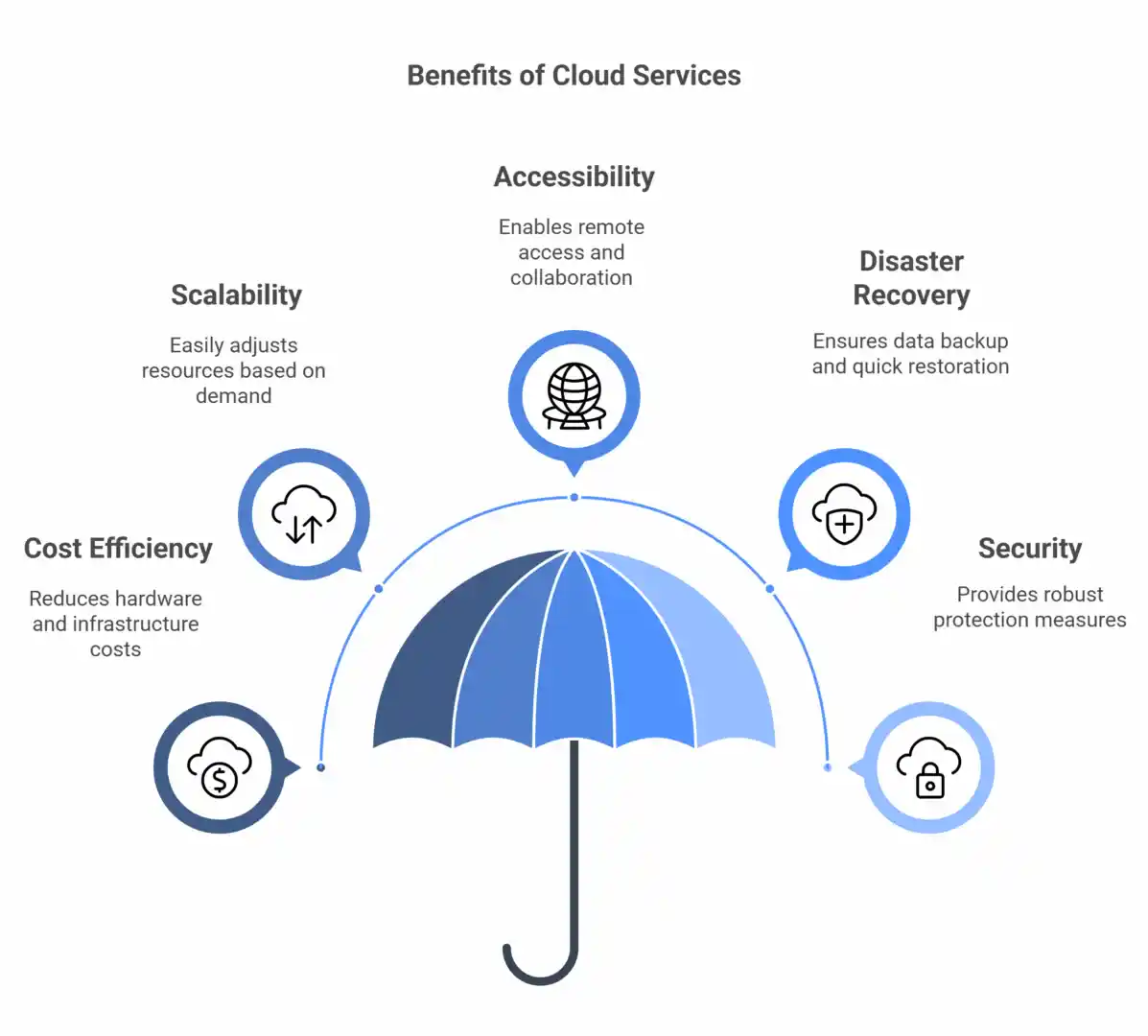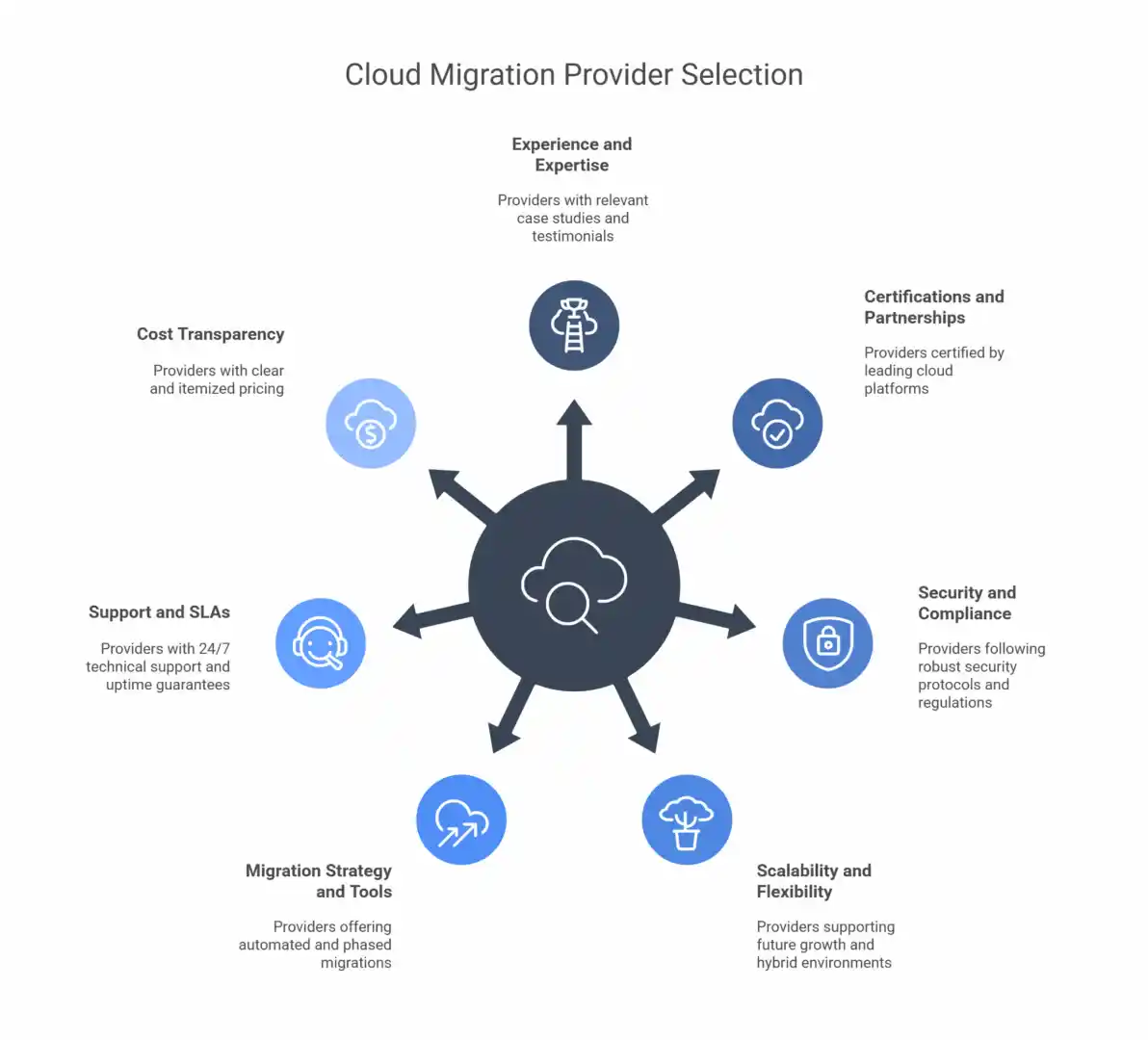Table of Contents
In the fast-evolving digital era, cloud computing has become more than just a trend—it’s a strategic imperative.
Many businesses are now moving their apps, data, and systems to the cloud. This move helps them grow, stay flexible, and cut costs.
But cloud migration can be tricky. Without the right skills, a company might face downtime, lose data, or run into security problems.
Cloud migration service providers can help. These experts guide businesses as they move from local systems to the cloud. Choosing the right one can be hard as there are many providers.
In this guide, you will learn how to choose the perfect provider for your business.
Understanding Cloud Migration Services
Cloud migration service providers are experts or companies that help businesses move their apps and data to the cloud. They use tools and knowledge to make the move smooth, whether it’s to AWS, Azure, Google Cloud, or a mix of these.
These providers typically offer:
- Assessment services: Evaluating your current IT landscape.
- Planning and strategy: Creating a migration roadmap.
- Migration execution: Moving applications, data, and infrastructure.
- Post-migration support: Ongoing optimization and troubleshooting.
They may specialize in various cloud environments:
- Public Cloud: Resources provided over the internet (e.g., AWS, Azure).
- Private Cloud: Dedicated cloud environments managed privately.
- Hybrid Cloud: A mix of public and private cloud environments.
Understanding what services you require is the first step toward narrowing down your options.

Assessing Your Business Needs
Before reaching out to providers, it’s crucial to assess your internal requirements. Here are key areas to focus on:
- Current IT Infrastructure: Audit existing servers, applications, and data volumes.
- Migration Goals: Define what you want to achieve—is it cost reduction, improved performance, enhanced security, or business continuity?
- Budget Constraints: Determine how much you’re willing to invest.
- Timeline: Are you working against a hard deadline due to contract expiration or security mandates?
A clear understanding of these elements will guide your search and discussions with potential service providers.
Key Factors to Survey When Choosing a Cloud Migration Service Providers
1. Experience and Expertise
Look for cloud migration service providers with a solid track record in cloud migrations, particularly within your industry.
Providers with relevant case studies and testimonials are more likely to understand the nuances of your business challenges.
2. Certifications and Partnerships
Cloud migration service providers often certify their partners. Ensure your service provider has certifications from leading cloud platforms like:
- AWS Certified Solutions Architect
- Microsoft Azure Solutions Expert
- Google Cloud Professional Cloud Architect
These credentials demonstrate technical expertise and adherence to best practices.
3. Security and Compliance
Data security should be non-negotiable. Ensure the provider follows robust security protocols and complies with regulatory requirements such as:
- GDPR (General Data Protection Regulation)
- HIPAA (Health Insurance Portability and Accountability Act)
- SOC 2 (System and Organization Controls)
They should also have clearly defined incident response and disaster recovery plans.
4. Scalability and Flexibility
Choose cloud migration service providers who can scale with your business. Whether you’re a startup or an enterprise, the provider should support future growth and accommodate evolving needs, including hybrid or multi-cloud environments.
5. Migration Strategy and Tools
Inquire about the provider’s methodology and tools:
- Do they offer automated migration?
- Do they use proprietary or open-source tools?
- Can they perform phased migrations or support legacy systems?
A structured approach indicates reliability and readiness for unpredicted challenges. IPAM solutions can further support the migration process by efficiently managing IP addresses and maintaining network consistency across environments.
6. Support and SLAs
Look into the provider’s service level agreements (SLAs):
- What are their uptime guarantees?
- Do they offer 24/7 technical support?
- Is support offered via phone, chat, or email?
A strong support structure ensures that your systems remain up and running during and after the migration.
7. Cost Transparency
Migration can be expensive. Make sure there are no hidden fees.
- Are costs clearly itemized?
- Is pricing hourly, fixed, or subscription-based?
- Are there costs for post-migration support or unexpected issues?
Transparent pricing helps avoid surprises and budget overruns.

Questions to Ask a Potential Cloud Migration Service Provider
- Can you provide a detailed migration roadmap tailored to our needs?
- How do you ensure minimal downtime and data integrity during migration?
- What post-migration support and optimization services do you offer?
- Do you have experience with our industry or business model?
- Can you share references or case studies similar to our scenario?
- How do you handle compliance and regulatory requirements?
- What is your incident response plan in case of a breach or failure?
These questions will reveal how well the cloud migration service providers are understanding your specific needs and how capable they are in managing risks.
Red Flags to Watch Out For
- Overpromising Results: Be careful of vendors who claim guaranteed zero downtime or unrealistic migration timelines without proper assessment.
- Lack of Transparency: Hidden fees, vague methodologies, or incomplete contracts are warning signs.
- No Certifications: Avoid providers without up-to-date certifications or partnerships with leading cloud vendors.
- Weak Security Policies: If the provider cannot clearly explain their data protection protocols, look elsewhere.
- No Clear Support Plan: A lack of post-migration support means you’re on your own once the migration ends.
Making the Final Decision
After evaluating multiple vendors, it’s time to make a decision:
- Shortlist top candidates based on experience, pricing, and support.
- Score them based on key criteria (e.g., expertise, transparency, SLAs).
- Involve stakeholders from IT, finance, and business units to ensure alignment.
- Request a Proof of Concept (PoC) if possible—this can help validate the provider’s capabilities before committing to a large-scale migration.
Remember, the goal is to establish a long-term partnership, not just a one-time engagement.
Conclusion
Selecting the right cloud migration service provider is an important decision. It affects your whole business, not just your IT team. A good cloud move needs more than technical skills. It also needs careful planning, clear communication, and a shared goal for your digital future.
To find the right partner, start by understanding your needs. Then, look at providers based on clear points and ask smart questions. This will help you move to the cloud safely and smoothly—so your business can get the most from cloud computing.
Take your time, do your homework, and invest in a provider who sees your success as their mission.
FAQs
What is a cloud migration service provider?
A cloud migration service provider is a company that helps businesses move their digital assets, workloads, and applications from on-premises or other cloud environments to a new cloud platform efficiently and securely.
Why is choosing the right provider critical for cloud migration success?
The right provider ensures minimal downtime, data security, cost-effectiveness, and a smooth transition, aligning cloud infrastructure with your business goals.
What are the 7 essential steps to selecting a cloud migration provider?
While the exact steps can vary, they typically include: assessing business needs, evaluating provider expertise, checking compliance and security measures, reviewing service-level agreements (SLAs), analyzing cost models, verifying customer support quality, and comparing provider portfolios.
How do I evaluate the expertise of a cloud migration provider?
Look for certifications (e.g., AWS, Azure, Google Cloud), past migration projects, industry-specific experience, and technical skills relevant to your business infrastructure.